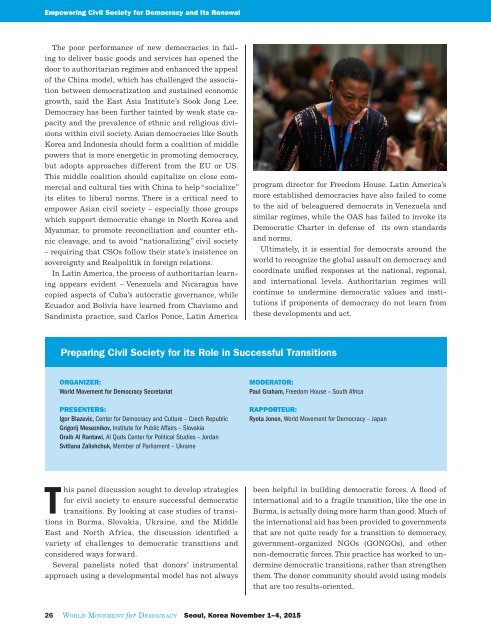You also want an ePaper? Increase the reach of your titles
YUMPU automatically turns print PDFs into web optimized ePapers that Google loves.
Empowering Civil Society for Democracy and Its Renewal<br />
<strong>The</strong> poor performance of new democracies in failing<br />
to deliver basic goods and services has opened the<br />
door to authoritarian regimes and enhanced the appeal<br />
of the China model, which has challenged the association<br />
between democratization and sustained economic<br />
growth, said the East Asia Institute’s Sook Jong Lee.<br />
Democracy has been further tainted by weak state capacity<br />
and the prevalence of ethnic and religious divisions<br />
within civil society. Asian democracies like South<br />
Korea and Indonesia should form a coalition of middle<br />
powers that is more energetic in promoting democracy,<br />
but adopts approaches different from the EU or US.<br />
This middle coalition should capitalize on close commercial<br />
and cultural ties with China to help “socialize”<br />
its elites to liberal norms. <strong>The</strong>re is a critical need to<br />
empower Asian civil society – especially those groups<br />
which support democratic change in North Korea and<br />
Myanmar, to promote reconciliation and counter ethnic<br />
cleavage, and to avoid “nationalizing” civil society<br />
– requiring that CSOs follow their state’s insistence on<br />
sovereignty and Realpolitik in foreign relations.<br />
In Latin America, the process of authoritarian learning<br />
appears evident – Venezuela and Nicaragua have<br />
copied aspects of Cuba’s autocratic governance, while<br />
Ecuador and Bolivia have learned from Chavismo and<br />
Sandinista practice, said Carlos Ponce, Latin America<br />
program director for Freedom House. Latin America’s<br />
more established democracies have also failed to come<br />
to the aid of beleaguered democrats in Venezuela and<br />
similar regimes, while the OAS has failed to invoke its<br />
Democratic Charter in defense of its own standards<br />
and norms.<br />
Ultimately, it is essential for democrats around the<br />
world to recognize the global assault on democracy and<br />
coordinate unified responses at the national, regional,<br />
and international levels. Authoritarian regimes will<br />
continue to undermine democratic values and institutions<br />
if proponents of democracy do not learn from<br />
these developments and act.<br />
Preparing Civil Society for its Role in Successful Transitions<br />
ORGANIZER:<br />
World Movement for Democracy Secretariat<br />
PRESENTERS:<br />
Igor Blazevic, Center for Democracy and Culture – Czech Republic<br />
Grigorij Meseznikov, Institute for Public Affairs – Slovakia<br />
Oraib Al Rantawi, Al Quds Center for Political Studies – Jordan<br />
Svitlana Zalishchuk, Member of Parliament – Ukraine<br />
MODERATOR:<br />
Paul Graham, Freedom House – South Africa<br />
RAPPORTEUR:<br />
Ryota Jonen, World Movement for Democracy – Japan<br />
This panel discussion sought to develop strategies<br />
for civil society to ensure successful democratic<br />
transitions. By looking at case studies of transitions<br />
in Burma, Slovakia, Ukraine, and the Middle<br />
East and North Africa, the discussion identified a<br />
variety of challenges to democratic transitions and<br />
considered ways forward.<br />
Several panelists noted that donors’ instrumental<br />
approach using a developmental model has not always<br />
been helpful in building democratic forces. A flood of<br />
international aid to a fragile transition, like the one in<br />
Burma, is actually doing more harm than good. Much of<br />
the international aid has been provided to governments<br />
that are not quite ready for a transition to democracy,<br />
government-organized NGOs (GONGOs), and other<br />
non-democratic forces. This practice has worked to undermine<br />
democratic transitions, rather than strengthen<br />
them. <strong>The</strong> donor community should avoid using models<br />
that are too results-oriented.<br />
26 World Movement for Democracy Seoul, Korea November 1–4, 2015


